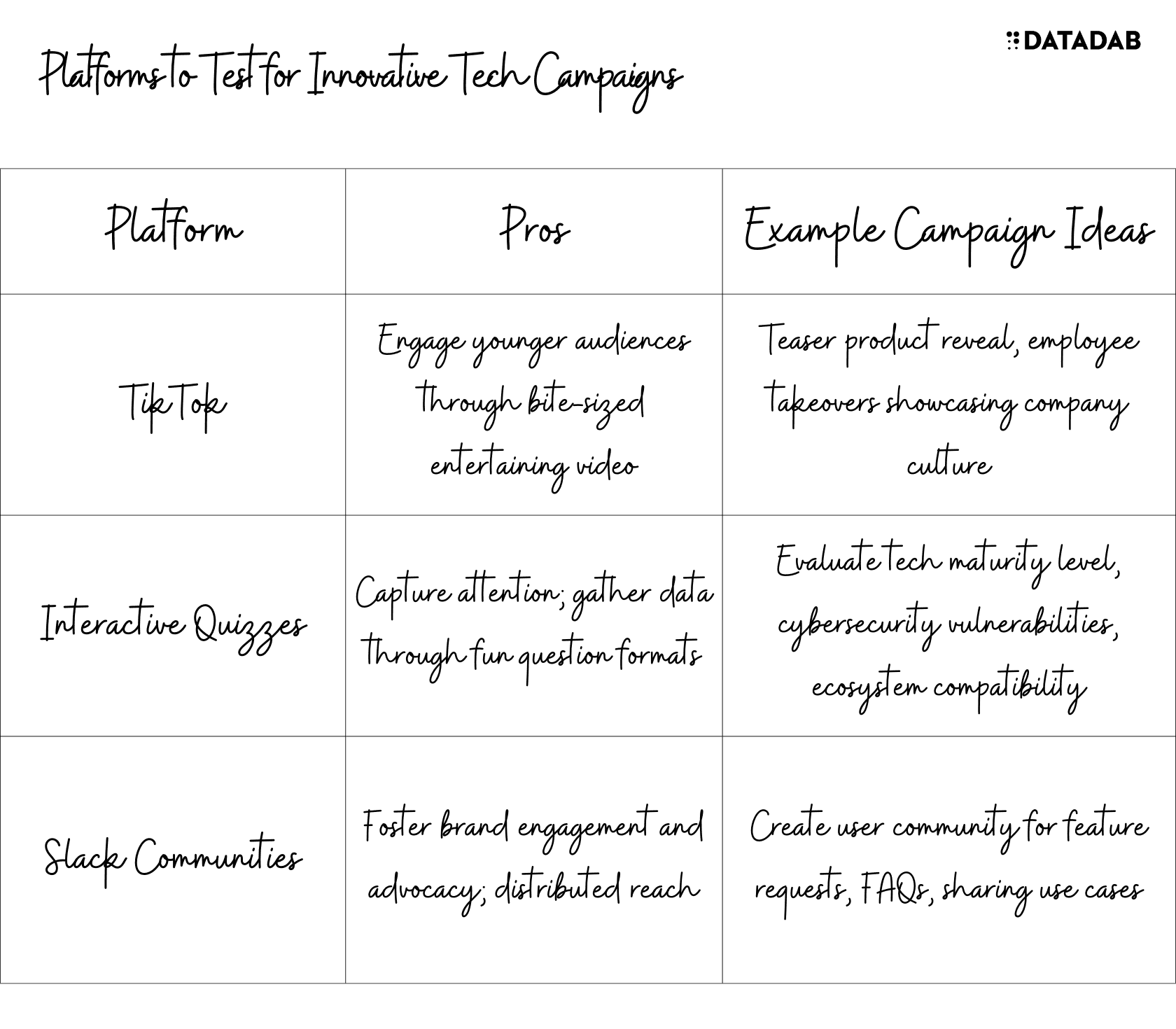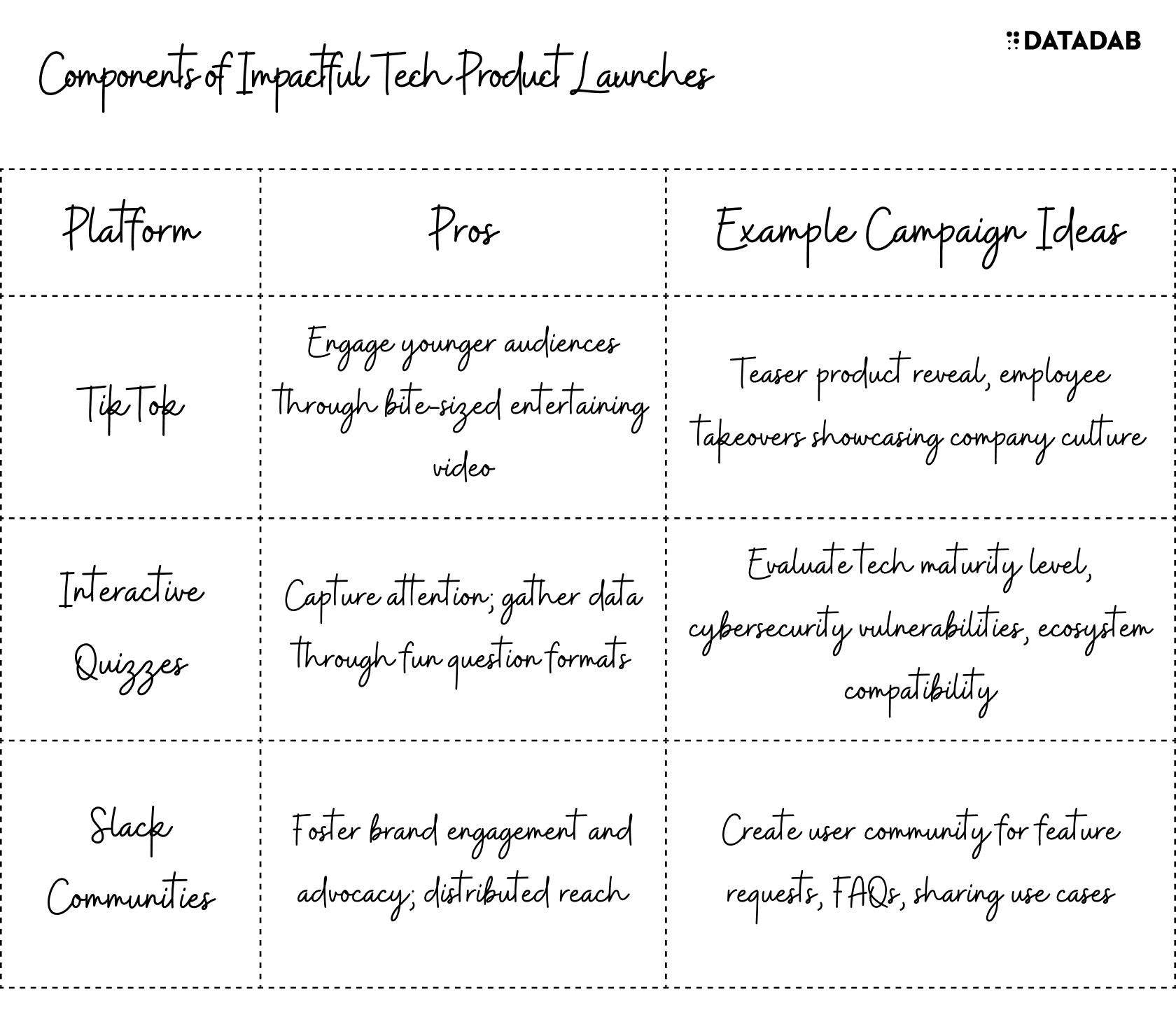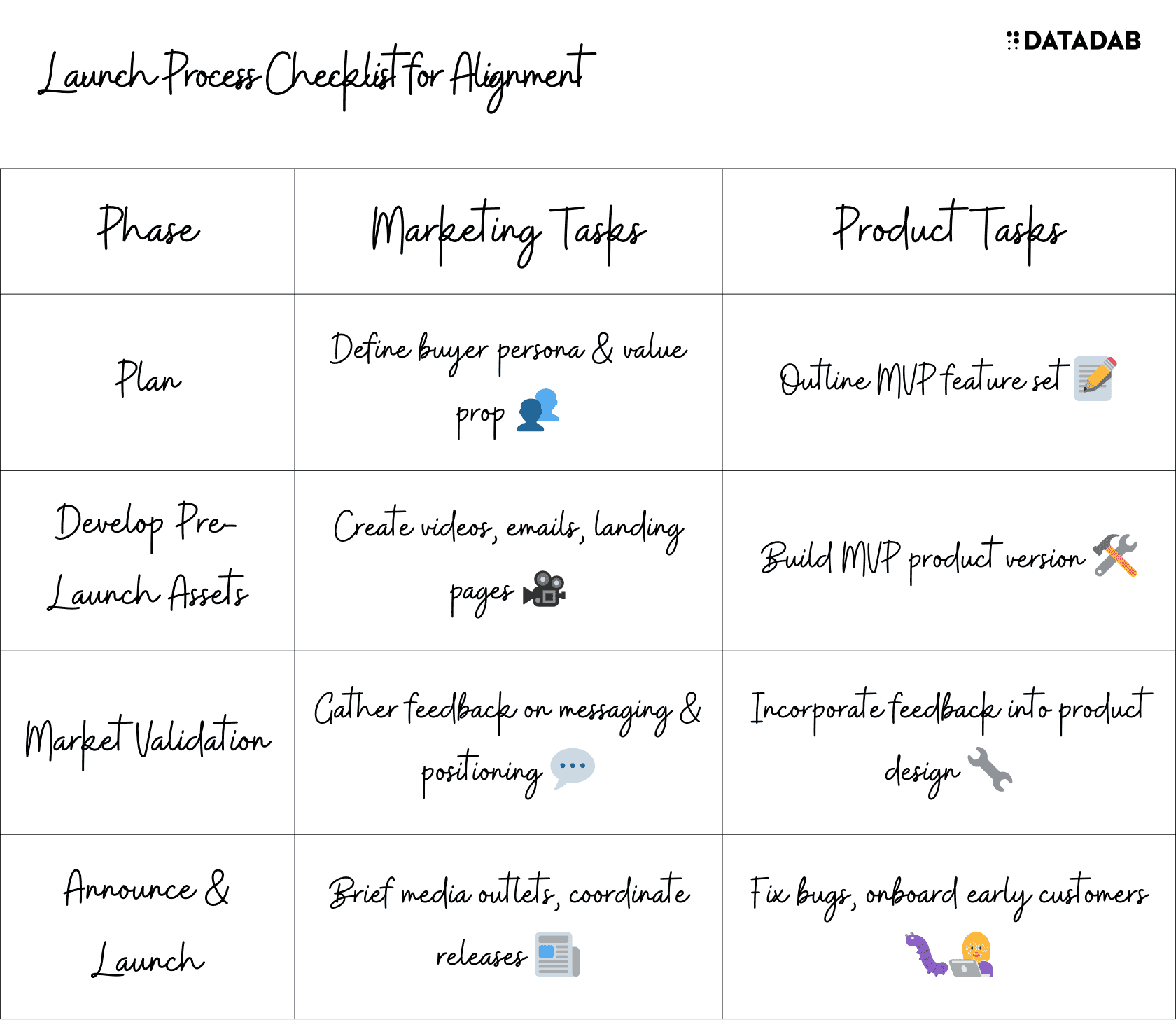Marketing for B2B technology companies comes with its own unique set of challenges. With longer sales cycles, complex products, and highly technical target audiences, traditional marketing strategies often fall flat. Tech marketers need to tailor their approach to resonate with engineering-minded buyers who expect substance over flash.
As the tech landscape evolves at a blistering pace, B2B tech marketing agencies have had to step up their game. The old model of brand building through tradeshows and print advertising no longer cuts it in an industry where buyers do copious research online before ever engaging with a sales rep.
The tech marketing agencies leading the way today take a consultative, data-driven approach while also embracing innovation. They collaborate closely with their tech clients to deepen understanding of the market and buyers. This enables them to develop product launch and campaign strategies specially crafted for the tech audience.

In this post, we’ll dive into some of the key ways today’s top B2B tech marketing agencies are changing the game for technology companies:
Tailoring Marketing Strategies for Tech Companies
Understanding the Tech Audience and Market
The foundation of impactful marketing is comprehending your audience. For B2B tech marketers, this means researching the tech landscape in microscopic detail - getting to know the buyers, influencers, and dynamics shaping tech buying decisions.
Top tech marketing agencies invest heavily in market research to map the industry, track trends, and determine where demand is heading. They use buyer persona development and journey mapping to decode the motivations and pain points of key buyer segments. And they continually feed these insights back into campaign strategies and messaging.
For example, Paradowski Creative relies on in-depth research to match clients with their best-fit market opportunities. As a data-driven agency, they help clients orient their products and messaging to ride waves of demand in current tech growth areas.
Crafting Messages That Resonate with Tech Clients
With market context in hand, skilled tech marketers translate complex product capabilities into compelling value propositions. They home in on the pressing problems tech buyers face and show how their solution stacks up against alternatives.
Top agencies are masters at creating differentiated messaging and positioning for tech companies. They showcase technical innovations in simple yet engaging ways rather than relying on dry feature lists. And they back up claims with credible evidence like analyst research, metrics, and customer success stories.
For instance, TopRank Marketing developed the concept of “Inbound B2B Marketing” to differentiate HubSpot’s approach. This resonated powerfully with buyers, fueling HubSpot's rise as an inbound juggernaut.

The Role of Innovation in Tech Marketing

Embracing Cutting-Edge Technologies and Platforms
In an industry centered on innovation, tech marketing teams must themselves stay on the bleeding edge. Agencies adept at B2B tech marketing eagerly adopt new technologies and quickly master fresh platforms.
They tap advances in marketing automation, AI-powered content creation tools, data analytics applications, and more. Instead of relying on the same stale tactics, they continuously test innovative channels and formats.
For example, Perkuto embraces platforms like TikTok to engage tech audiences with an element of fun. And they build interactive tools like quizzes and assessments to capture buyer attention in new ways.

Case Studies of Innovative Tech Marketing Campaigns
Leading B2B tech agencies dreaming up inventive growth hacking tactics tailored to digital-native tech buyers. They help clients launch viral campaigns that display both creativity and strategic rigor.
Mailchimp’s “Did You Mean Mailchimp?” campaign hijacked searches for competitors to engage potential prospects. Pardot created a “Pi Day” calculator tool that went viral among the tech crowd on March 14. And Drift’s book “Conversational Marketing” sparked discussion by proclaiming traditional marketing dead.
These innovative campaigns generated leads while positioning brands as respected tech marketing trailblazers. They grabbed attention with memorable formats that got people talking - building buzz instead of directly selling.

Collaborating for Product Launches and Campaigns
Strategies for Successful Product Launches
Bringing a new tech product from concept to commercial launch requires meticulous coordination between marketing and product teams. Leading B2B tech marketing agencies collaborate intimately on launch strategy and planning.
They advocate formal launch processes ensuring messaging, sales tools, and marketing campaigns all support product rollout. Launch checklist templates and automated workflows reduce scrambling. They also establish launch frameworks flexible enough to allow pivoting based on buyer feedback.
For instance, Celsius Agency employs agile launch management processes with built-in testing and refinement cycles. This allows new products and positioning to rapidly evolve until product-market fit is achieved.

Aligning Marketing Efforts with Product Development
Timing is everything, so syncing marketing and product roadmaps is crucial. Top agencies work backward from launch dates to schedule positioning, messaging, and campaign creation.
They also regularly brief product developers on target buyer needs and market trends. This allows the product team to engineer features and capabilities that align with demand. When marketing has a direct line into the product pipeline, they can tease announcements, prime influencers, and prepare launch marketing well in advance.
For example, SevenTablets aligned extensive pre-launch content development with a structured NDA lifting process for the Zoom video conferencing platform. This primed the market and created pent-up demand before Zoom’s solutions officially went to market.
The Future of B2B Tech Marketing
Predictions and Emerging Trends
So where is B2B tech marketing headed in the years ahead? Leading agencies predict customer-centricity, personalization, and non-interruptive formats will dominate.
As buyers grow overwhelmed by flashy advertising, marketers must adopt a more helpful, educational approach. Content will focus on addressing buyers’ questions and struggles through the purchasing process.
Marketing and sales will also tightly integrate to coordinate hyper-targeted, 1:1 multi-channel nurturing. Leads will hear from brands only when messaging directly answers their current questions or priorities based on observed research behavior.
Formats like short-form video, podcasts, and interactive tools will replace distruptive ads. Messages will land right when and where buyers are most receptive to recommendations instead of interrupting their flow.
For instance, Stein IAS envisions a future driven by “Converged Media” - blending earned, owned, Social and Experiential media for deeper buyer engagement. And B2B International believes content platforms will link Sales, Marketing, Product and Service teams to unify the customer experience.
Staying Ahead in the Tech Marketing Race
B2B technology marketing faces ever-evolving complexity and demands. Delivering results means both mastering the perpetually shifting tech landscape and pushing marketing innovations.
As technology permeates all industries, tech marketers must become ubiquitous experts on emerging tools while also trailblazing new go-to-market strategies. But for agencies hungry to test unproven tactics and technologies, these challenges offer unmatched opportunities for competitive differentiation.
The agencies winning tech accounts today display relentless curiosity, creativity and technical know-how. They address clients’ immediate sales objectives but also proactively spot openings to position them for future growth.
By both leveraging and advancing marketing best practices for tech firms, these agencies ensure their clients - and their own agencies - remain atop the tech marketing podium.
FAQ
1. Why do technology companies need specialty marketing agencies?
Technology companies operate in fast-paced markets with near-constant disruption. New competitive threats emerge constantly while customer needs rapidly evolve. Capturing the attention of engineering-focused buyers requires a scientific, data-driven approach.
Generalist agencies often lack in-depth expertise in navigating the unique dynamics of technology marketing. Specialist B2B tech agencies live and breathe the pulse of specific tech sectors. They possess technical knowledge along with relationships with the right influencers and media outlets. This allows them to develop sophisticated positioning that resonates with the target audience. They also continually test and fine-tune marketing tactics using advanced analytics dashboards tailored to tech metrics.
2. What are some key trends changing B2B technology marketing today?
Several significant trends transform modern B2B tech marketing, including the rise of digital channels, buyer self-education, and proliferating technologies. Today's buyers conduct extensive independent research before engaging vendors. This makes search, content, and social marketing essential to serve buyers with the right information at the right time.
Media channels and marketing technology also continue to expand at a head-spinning pace. Orchestrating synchronized messaging across platforms using the ideal mix of automation and personalization is an emerging imperative. As buyers suffer information overload, brands must adopt less disruptive, more consultative marketing positioning.
3. How is working with a niche tech marketing agency better than using an internal team or large cross-industry agency?
While leveraging internal marketing teams offers institutional knowledge and tighter access to product pipelines, niche B2B tech agencies bring several advantages:
Domain Expertise: Specialist agencies concentrate focused expertise in particular tech sectors. This allows them to leverage existing relationships with multipliers and fine-tune positioning for niche tech buyer motivations.
Marketing Technology Competency: Leading tech marketing agencies stay ahead of the latest marketing automation tools, analytics systems, and campaign management platforms in order to continuously test innovative formats. Internal teams often lack the same level of martech skill and integration.
Flexibility and Cost Efficiency: External marketing partners operate on a flexible, scalable model according to client needs compared to the fixed costs of internal teams. Agencies also apply expertise accumulated across client engagements.
4. What types of critical research should tech marketers perform?
Tech marketers should continually conduct quantitative and qualitative research to achieve deep market intimacy, including:
- Competitive intelligence to identify and map threats from rival products
- Market trend analysis by monitoring adoption curves for emerging technologies
- Buyer persona development through surveys, interviews, and focus groups
- Customer journey research to pinpoint pain points and decision motivators
- Campaign testing via methods like A/B testing and attribution modeling
- Monitoring reviews and social conversations for shifts in sentiment
This research should drive messaging, positioning, and campaign strategies.
5. How can tech brands use content and social media marketing to engage modern buyers?
Today's buyers expect access on demand to educational, unbiased information to guide selection and usage of technology solutions. Branded content that offers meaningful insights without directly pitching products can therefore highly influence decisions.
Platforms like blogs, webinars, and podcasts that take a thought leadership approach build authority. Interactive tools also capture attention by providing tactical advice. Active social media presences that highlight use cases, customer results, and industry perspectives also sway opinions thanks to peer trust.
6. What are some best practices for marketers and product teams collaborating on tech product launches?
Streamlined collaboration between marketers and product developers ensures smoothly coordinated launches. Recommended practices include:
- Establishing a formal launch process with assigned owners and timelines
- Briefing product developers continuously on target customer and market trends
- Planning announcements and messaging subject to agile adjustment as launch approaches
- Building integrated models to evaluate launch KPIs across usage, satisfaction, sales velocity and more
- Conducting extensive customer development research to refine MVP feature sets
- Using beta testing and early access programs to incorporate user feedback into final product tuning
By working in lockstep, product roadmaps and marketing campaigns align for optimal impact.
7. Why should tech companies produce custom content formats like podcasts and short videos?
Attention spans shrink while media choice explode, making standing out with creative content essential. Podcasts and short video series also outperform for information retention compared to text-based formats.
Encapsulating messages into digestible audio or video snippets that educate and entertain better resonates with modern buyers. Tech brands publishing recurring expert-led shows also lend an air of thought leadership. Furthermore, multimedia content translates better across platforms like Instagram and LinkedIn.
8. How can marketing processes leverage automation?
While the human touch remains essential for relationship-focused B2B deals, targeted automation boosts efficiency at scale. Tech marketers can automate repetitive tasks like campaign analysis, lead scoring, email nurtures, and even content creation.
Platforms like Marketo and HubSpot integrate with sales databases and website analytics to track buyers' digital body language. Software can then trigger relevant follow-ups or recommend the next pieces of content to progress prospects. AI augmenting business writer creativity for faster production of blog posts, social media updates, and targeted landing pages.
Applied judiciously, marketing technology can free staff to focus on high-touch advisory services to close deals.
9. Why should tech brands obsess over customer experience and centricity?
In crowded tech sectors, brands seen as truly customer-centric - not just paying lip service - earn outsized gains in loyalty and referrals. Engineering word-of-mouth through awesome customer experiences gives a measurable edge.
Customer advisory panels soliciting product feedback, branded online communities to share best practices, customer success managers guiding onboarding and adoption - these demonstrate commitment beyond the sale. Surprise-and-delight gestures like exclusive expert access also strengthen emotional connections to cultivate brand advocates.
10. How can success measurement empower future marketing optimization?
Quantifying marketing performance through detailed metrics fosters continuous improvement. Technology marketers should gauge both immediate campaign or content effectiveness and overall funnel progression towards revenue.
Sophisticated attribution tracks first touch through to closed deal so teams can double down on truly high-yielding activities. A/B testing web pages, emails, ad variants uncovers messaging resonance. Surveys give candid qualitative data on brand sentiment.
Careful analysis of metrics patterns combined with verbatim customer feedback offers a roadmap to optimize resource allocation. Ongoing testing also prevents reliance on stagnant strategies unfit for evolving tech buyers.






